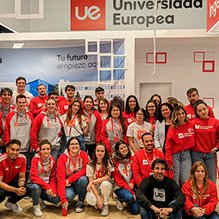-40% Discount of 40% on the reservation of a place for the course 24/25. Only until 30th April! Check the legal terms
The Business Management Degree at Universidad Europea is a four-year programme designed to equip you with the skills to lead in the ever-changing business world. The business management and entrepreneurship degree, which consists of a total of 240 ECTS and takes place at our campus in Valencia, includes subjects such as economics, strategic management and human resource management. All of this will give you skills such as communication, leadership and teamwork, and you’ll be able to adapt to all sorts of professional environments
With the business world becoming ever-more globalised, you will have the opportunity to carry out internships, work placements and study exchanges at companies and universities in Europe, the US and Asia, allowing you to boost your international profile and network with students and professionals from other countries and cultures.
| Campus-based | |
| Valencia | 240 ECTS |
| Start: 16 sep. 2024 | Title issued by Universidad Europea de Valencia |
| 4 years | School of Social Sciences and Communication |
| Official degree |
-40% Discount of 40% on the reservation of a place for the course 24/25. Only until 30th April! Check the legal terms
91%
Our students find employment in less than 12 months.
55%
You'll live in a diverse environment that is more multicultural than that of other universities.
3.600
UEV has a multitude of educational cooperation agreements with other centres.
Take a glimpse into your UEV experience
Study at an urban innovation campus in the heart of Valencia, with 10,000 m2 of facilities surrounded by green spaces. Put theory into practice at our dental clinic, patient wards, the criminalistics lab or the translation booths.
We have agreements with many universities in different continents so that you can choose the one that best suits your training.
PRIMER CURSO
| Materia | ECTS | Tipo | Idioma de impartición |
|---|---|---|---|
| Social and Economic Thought | 3 | OBLIGATORIA | Inglés (en) |
| Business Fundamentals | 6 | BASICA | Inglés (en) |
| Introduction to Economics | 6 | BASICA | Inglés (en) |
| Consumer and Corporate Behaviour | 6 | BASICA | Inglés (en) |
| Finance I | 6 | BASICA | Inglés (en) |
| Financial Accounting I | 6 | BASICA | Inglés (en) |
| Business Mathematics | 6 | BASICA | Inglés (en) |
| Marketing | 6 | BASICA | Inglés (en) |
| Business Law | 6 | OBLIGATORIA | Inglés (en) |
| Management Technologies | 3 | OBLIGATORIA | Inglés (en) |
| Personal and Professional and Efficiency | 6 | OBLIGATORIA | Inglés (en) |
SEGUNDO CURSO
| Materia | ECTS | Tipo | Idioma de impartición |
|---|---|---|---|
| Macroeconomics | 6 | OBLIGATORIA | Inglés (en) |
| Tax Systems | 6 | OBLIGATORIA | Inglés (en) |
| Finance II | 6 | OBLIGATORIA | Inglés (en) |
| Statistics | 6 | BASICA | Inglés (en) |
| Financial Accounting II | 6 | OBLIGATORIA | Inglés (en) |
| Strategic Management I | 6 | BASICA | Inglés (en) |
| Business Administration | 6 | BASICA | Inglés (en) |
| Foreing Language | 6 | OBLIGATORIA | Inglés (en) |
| Personal Impact and Influence | 6 | OBLIGATORIA | Inglés (en) |
| Intenet Data Analysis | 6 | OBLIGATORIA | Inglés (en) |
TERCER CURSO
| Materia | ECTS | Tipo | Idioma de impartición |
|---|---|---|---|
| Strategic Management II | 6 | OBLIGATORIA | Inglés (en) |
| Production and Operations | 6 | OBLIGATORIA | Inglés (en) |
| Taxation | 6 | OBLIGATORIA | Inglés (en) |
| Econometrics: Planning and Decision Making | 6 | OBLIGATORIA | Inglés (en) |
| Cost Accounting | 6 | OBLIGATORIA | Inglés (en) |
| Financial Management | 6 | OBLIGATORIA | Inglés (en) |
| Commercial Management | 6 | OBLIGATORIA | Inglés (en) |
| Human Resources Management | 3 | OBLIGATORIA | Inglés (en) |
| Creativity and Innovation | 3 | OBLIGATORIA | Inglés (en) |
| Entrepreneurial Leadership | 6 | OBLIGATORIA | Inglés (en) |
CUARTO CURSO
| Materia | ECTS | Tipo | Idioma de impartición |
|---|---|---|---|
| Professional Internship I | 6 | PRÁCTICAS ACAD. EXTERNAS | Inglés (en) |
| Professional Internship II | 6 | PRÁCTICAS ACAD. EXTERNAS | Inglés (en) |
| Professional Internship III | 6 | PRÁCTICAS ACAD. EXTERNAS | Inglés (en) |
| Final Project | 12 | TRABAJO FIN DE GRADO | Inglés (en) |
| Innovation Management | 6 | OPTATIVA | Inglés (en) |
| Financial Analysis and Planning | 6 | OPTATIVA | Inglés (en) |
| Digital Marketing | 6 | OPTATIVA | Inglés (en) |
| Startup: Creation and Management | 6 | OPTATIVA | Inglés (en) |
| Business Operations | 6 | OPTATIVA | Inglés (en) |
| University Activities | 6 | OPTATIVA | Inglés (en) |
| Games Theory | 6 | OPTATIVA | Inglés (en) |
Starting year: 2017
140
Internships are a key component of your training. Acquiring experience after what you have learnt in your degree is the best way to enter the employment market. There are two types of internships: curricular—which are included in your study plan—and extracurricular—which you can do on a voluntary basis.
In order to complete curricular internships in companies, you will need to have 50% of the credits approved and registered before starting your internship. These internships are monitored by the company and the internship coordinator, and interim and final reports are prepared for evaluation.
If you want to take your work experience to the next level before finishing your university education, you can pursue an extracurricular internship. You can do them in any academic year, but keep in mind that internships are a formative complement to your studies; therefore, the more knowledge you have acquired throughout your studies, the more you will benefit from the internship experience.
The UEV has 3,600 educational cooperation agreements with other centers.
There are two types of internships when studying ADE in Valencia:
Compulsory (Curricular).
450 hours of compulsory internships, in companies in Spain or abroad, which take place over a period of three or four months in the 3rd and 4th years.
Voluntary (Extracurricular)
From the 3rd year onwards.
It is a profile highly demanded by companies working in an international context. It is increasingly necessary to have specialists who develop processes for globalisation and have the right tools to make informed economic, financial and business decisions, while taking into account the various factors and international impacts.
Start your future at Universidad Europea
Choosing what to study is one of the most important decisions, so we have a process and an advisory team that will help guide you on this path.
In 3 steps you can become a student at Universidad Europea.
1
Start your process by calling 961043883 or request information and our advisors will contact you.
2
Once you have been admitted, you will be able to pay your reservation fee to guarantee your place.
3
Submit the necessary documentation to formalize your enrollment.
The degree of Business Management and Entrepreneurship is aimed at young people interested in the world of business with a strong international outlook.
People wishing to develop their professional career in the world of business or enhance their entrepreneurial skills to set up their own company on solid foundations.
Professionals who are looking to inherit a family business or wish to complete or update their training in order to manage it effectively.
The prerequisites to access this bachelor’s programme are those established in RD 1892/2008, of 14 November, and current applicable legislation, specifically:
Get to know the facilities and discover why Universidad Europea is made for you.
The faculty on this degree has 53% of doctors.
Entrepreneurship can be defined as the ability to develop, launch and organise a business enterprise, and see it grow. It involves running a business to earn profit. An entrepreneur is a decision-maker who establishes and administers a startup along with the risks and uncertainties that go along with it - not every start-up will be a success story!
Business management, on the other hand, refers to the process of managing the administration of a business organisation, no matter what sector. A manager within that organisation is responsible for overseeing the business operations carrying out other day-to-day tasks related with the smooth running of the company.. They help the employees in working towards the fulfillment of the organisation’s goals and objectives.
The business management and entrepreneurship degree at Universidad Europea will equip you with the skills and knowledge necessary to succeed no matter which path you decide to go down: entrepreneur or business manager. While both are slightly different, they require similar understanding of the world of business. For that reason, our study plan is broad and covers areas such as:
Our degree in business management and entrepreneurship, taught entirely in English and made up of 240 ECTS, lasts for four years.
Throughout this time you will have opportunities to study abroad, getting to know other study methods, and expanding your network of connections - something invaluable when it comes to setting up your own company or working within large multinational organisations. In both the 3rd and 4th year of this program, you can study in multiple destinations around the world, including the USA, UK, and Ireland.
With a focus on business management or starting their own companies, many of our graduates end up going into the world of finance or business, both within the public and private sectors.
Examples of what previous students go upon graduation are:

